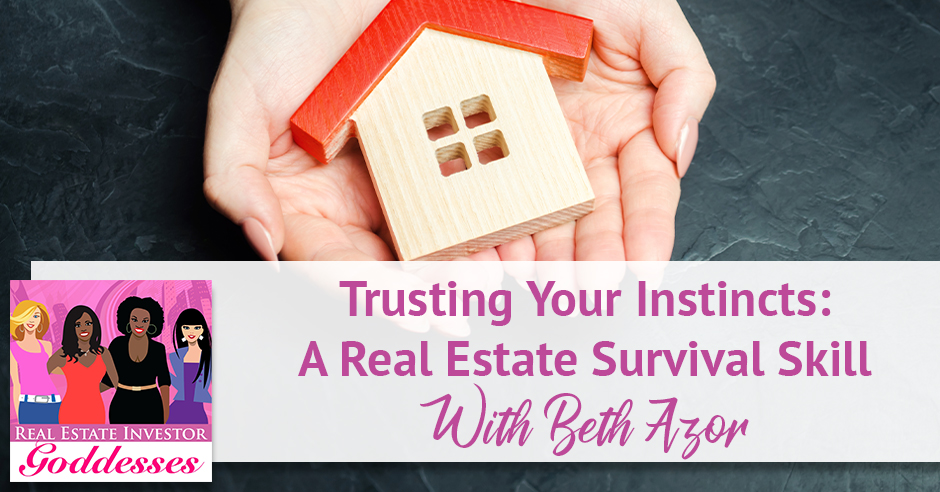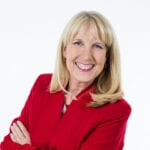
The concept of a uniquely female (and often correct) intuition is not an uncommon concept in the popular imagination. Yet everywhere women go, they’re made to feel as though their opinions are worth less in the spaces where they want to be. This is why, for women entering any industry, always trusting your instincts is an important survival skill. Beth Azor is a longtime veteran of the commercial real estate industry and is the owner of Azor Academy. With Monick Halm, she shares her experiences of learning to trust her instincts in successfully working her way to the top of the commercial real estate industry. Allow yourself to believe in your own instincts today!
—
Watch the episode here:
Listen to the podcast here:
Trusting Your Instincts: A Real Estate Survival Skill With Beth Azor
We interview amazing badass real estate investor goddesses, women that are crushing it in the real estate space. I am super thrilled for our guest. She’s certainly no exception to the badass rule. She’s a 34-year veteran of the commercial real estate industry. She owns Azor Academy, which specializes in consulting services, training, sales, leadership, coaching, acquisition, due diligence and market analysis. Beth Azor owns and manages an $80 million portfolio of commercial retail properties in Southeast Florida. She’s an author. She wrote and published the book, Don’t Say No for The Prospect, a guide to help propel the career of both novice and experienced leasing agents. She also wrote The Retail Leasing Playbook, which is a detailed how-to book on leasing commercial retail space. She is a frequent guest on Business and Commercial Real Estate Podcast and I’m excited to have her here. She hosts a monthly Rockstar Book Club where she and her listeners review non-fiction business-related books. Her rockstar list of clients include Brixmor Properties, Urban Edge Properties, The Shopping Center Group, Phillips Edison, Kimco and DLC management. She has a laundry list of who’s who in the commercial space. She’s a graduate of Florida State University and she’s also the past Chairman of the Board and Founder of the Florida State University Real Estate Foundation. I’m so excited to have her. Welcome, Beth.
Thank you, Monick. Thanks so much for having me. I’m excited to be here with the other goddesses and badass.
Welcome to the club. You seem you’ve been part of the club for 34 years now, so we’re excited to have you.
I wish I could say I started when I was ten, but that’s not the case.
I’m particularly excited to have you because we generally have people that are in the retail space and your focus is in the commercial space. How did you get started in real estate investing?
Finding money is not the hardest part, but it's definitely complicated. Share on XI was working at Affirm, that was a shopping center leasing and management company. My boss came to me one day and said, “We’re going to buy a shopping center, do you want to put money in?” I had been leasing for a couple of years and I was making about $60,000. I said, “I don’t have any money.” About a year later, he came to me and said, “We’re going to buy another shopping center. Do you want to put some money in?” I’m making about $85,000 to $90,000 a year. I said, “I don’t have any money.” The next year, he came and said, “We’re going to buy this shopping center. Do you want to put some money in?” For the third time, I said, “I don’t have any money.” By now I’m making about $100,250. He screamed at me and said, “This is unacceptable. You should be saving money out of every commissions that you make and you should be investing.” He took me to a local bank and he co-signed a $50,000 loan for me. That was my first taste of investing. We bought a shopping center, we increased the value and six months later, refi and everyone got their original equity back. That was the taste that I never looked back from there. I was very blessed to have a guy like that did that for me because I know many people don’t have that opportunity and that mentor to do that. I was very lucky. I was 32 years old when that happened.
That’s super lucky and super awesome. A lot of people can relate too. You have a certain amount of income and you’re like, “I don’t have any money.” Your income increases but then you have sense to keep going and going. To have some tough love, they’re like, “We’re going to change this.” That’s amazing. That was your first taste of it. Tell us where are you now?
I was at that company for eighteen years. I was the president for the last six years since I was there. While I was there, I invested in deals that he went and got that he acquired, so I owned about what I call blades of grass in shopping centers that he invested in. In 2004, I left to go on my own because I wanted to buy stuff on my own account versus following in his footsteps and shadowed. My goal back then in 2004 when I started my own firm was to buy one deal every two years. I own six shopping centers and I gave back a shopping center during the recession and three pieces of land either sold or gave back during the recession. Three I gave back and one I sold. I’m on the path to do one every two years. I’ve been gone for fifteen years. Had I not given the shopping center and the three pieces of land back, I would have had eleven. I beat my goal. I owned six shopping centers, two of which I developed from ground up and they’re worth about $80 million in value. I did it on my own, raised friends and family money, got loans, learned all about lending because when I was at his company, he did all of that. When I left, I had to do all of this on my own, which I know I’ve listened to the other podcasts. Finding the money is not the hardest part but it’s complicated and you’ll learn a lot when you start raising the funds or looking for mortgages.
I love your story. I’m so inspired. I want to take a step back because most people are familiar with the apartment or a house because they live in them. Can you share some of the differences between owning a shopping center and an apartment building?
I’ve never owned an apartment building but I can tell you when you buy a shopping center, you’re investing in the leases. Let’s say you buy a five and ten in shopping center with a Starbucks, an insurance agent, a barbershop and a real estate office. You are spending a little bit of the money on the actual physical building and land, but mostly the number that is created as the sale price comes off of the income and it’s an operating income. Depending on the market, it could be a cap rate of ten or it could be a cap rate of four or five. The lower the cap rate, the higher the price, meaning the least amount that you as an investor is willing to get back on your money, 5%, 6%, the higher the price versus a ten cap. Owning the shopping center, you collect rent from the tenants whether they’re credit tenants or mom and pop tenants. They take care of everything inside of their space. The only thing you have to worry about is the parking lot, the lights in the parking lot, the sidewalk, making sure it’s clean and safe, and the roof. Everything else, the tenant takes care if there’s a toilet issue or air conditioning issue. That’s great. I don’t get calls in the middle of the night or during Christmas, “My toilet is overflowing.”

Trusting Your Instincts: Bad retail locations are centers where you have lots of competition and too many vacancies or centers where tenants provide a lot of friction for their customers.
They pay their share of taxes, insurance, etc. I was eighteen when I got my real estate license because my parents were in residential. All through college during the summers, I’d work for them in their office and sit open houses. I had experience with residential. What I like so much about retail is I get to meet a different entrepreneur every day. I was showing space to a barbershop. The next day I’m showing space to a tutoring facility. I’m building a Starbucks and they’re opening. I get to meet all of these different entrepreneurs, mom and pops and corporate people. I like the variety of that.
In terms of apartment buildings and the one I’m talking about commercial mortgage, commercial property, and it’s five or more units. It’s going to be based off of the NOI. What’s nice about the retail space is you have these two beautiful triple net leases. Once the tenant is in, it’s a lot less property management. I want to ask you about a couple of the challenges with retail right now. People talk about retail is dead with all everything that’s happening with the internet and you’re all-in to retail. What’s your answer to that?
I get asked about it a lot. I’ve listened to some of your podcasts, so I can’t guess the age of the readers because they’ve been all over which has been very fascinating. I will tell you that in the ’60s and ’70s, there were these things called catalogs. Do you remember Sears catalogs? Nowadays, the retail sales revenue in the US is about $7.3 trillion and online sales is 7%. During the catalog era, catalogs were 10%. People weren’t freaking out about that. Online sales will continue to increase. As online retailers go and raise their series C, E, F and B and whatever is funding, they’re raising $30 million, $80 million, $100 million. What we find that they’re doing with that money is they’re opening up bricks and mortar stores. Bonobos and Warby Parker and Wayfair. These stores that have been traditionally online have now realized that when they open a store in an area where they have big online sales, they obviously know that because they have the data, their online sales go up. What the traditional retailers have found that have added online sales, Walmart, Target, Home Depot, when they close the store, their online sales go down. In the retail industry, it’s called the halo effect. What both online and brick and mortar stores are learning is it’s a partnership. Physical stores need to have online and when online open physical stores, the revenues across the board go up. I am not worried about the retail industry.
If you have a shopping center in a market where there are 40 shopping centers, I wouldn’t buy a shopping center where there are 39 other shopping centers with vacancy. You have to be a smart investor. I like to buy shopping centers based on the supply and demand theory, where there’s a lot of housing and very few commercial properties. Also going forward, there’s what I call the 4F words. When I speak on podcasts, I have to think, “Which podcasts can I say that?” Since you call your readers badasses, I can say but this is a tease because the 4F words are fun, fitness, food and then go with me here, physicians. The new shopping center tenant is food. Years ago, if you owned a shopping center, you didn’t want more than 10% to 15% of your tenants to be food because they’re parking hogs. Now, it’s acceptable that about 40% of your shopping center is food and restaurants.
Years ago, you didn’t see bounce houses and trampoline parks, ax-throwing places and arcade game places. You didn’t see them as wildly expanding as they are. That’s the fun component which means it’s the experience getting the people out of their homes, away from their computers and offering an experience. Physicians, which is the Baby Boomer generation which I am part of, is the largest generation to retire. Their medical needs are expanding significantly. You’ll start to see in every market urgent cares popping up on every corner. Every shopping center is going to have an urgent care and most of them are backed by the local nearby hospitals. It’s a great credit. The new shopping center will have food, fun, fitness and physicians. Then the whole fitness craze which is Pure Barre, CrossFit and SoulCycle. Because everyone is so into their physical health, you’re seeing that you have these boutique fitness concepts expanding in every center as well, Orangetheory. I do think bad retail is dead but I don’t think good retail is dead for those reasons.
Your biggest mistake would be to not listen to your own instincts. Share on XWhat’s bad retail?
A center where you’ve got 40 other centers and tons of vacancy or a center full of tenants that provide a lot of friction for their customers. 7-Eleven has announced that in the next months, there will be cashier-less stores because time for all of us is our number one commodity. Just like the Amazon to-go stores, 7-Eleven has announced that you’ll be able to walk into a store, grab a pack of gum and walked out and not even remove the friction.
There are all of these experiences or things that people are not going to be able to do a lot. You can’t go to the bouncy and do that online.
You can’t get your nails done, your hair done.
You can get food delivered to your house, but that experience of going out to eat, it’s all of those things. They need any places. There are businesses like yours that provide that. I love this asset class. What I’ve been seeing, and I don’t know if this is what you’re seeing too, is that the cap rates are not compressing, but maybe other people are getting a little afraid of retail. Sometimes you can be finding some better deals.

Trusting Your Instincts: The biggest mistake is identifying an asset and not listening to your own instincts about it.
In some markets, there are some good deals to be had and in the better markets, it’s still very competitive but that’s okay. If you work your market, farm your market, understand all my shopping centers are within ten minutes of my house. I have five things I’m looking to buy. They’re all off-market. All the sellers have said, “I’m not interested in selling,” but two of my six deals I got because I’m respectfully persistent, I called every three or four months. One day, I remembered that one of my centers, the guy called on December 2nd, “It’s your lucky day.” He’s an 87-year-old guy, Stanley. I go, “Why is that, Stanley?” He said, “Because I’m going to sell my center to you. I have one condition.” “What’s that?” “You need to sell by the end of the year.” I said, “Stanley, it’s December 2nd. I can’t get a loan in time. You have to hold a purchase money mortgage.” He says, “I’ll do that for a year.” That’s what we did. We agreed on a price. He held back the mortgage. I put money down and now I own that center. I refi out a year later. He didn’t go to market because I had been persistent. I had owned two centers near him and he knew I was the right buyer. I don’t know if I paid a little more or a little less. The good news is I didn’t have to compete because I was the top of mind. When he woke up and realized, “I’m going to sell this before the year-end,” he called me, we made it happen because I was the top of mind.
I could talk all day with you. I want to ask you the question that I always ask all my guests and it brings up a lot of goals because I find that we learn so much more when things don’t go according to plan like it’s smooth sailing. What would you say was your biggest mistake and what did you learn from it?
My biggest mistake and it’s happened to me unfortunately six times until I woke up. I didn’t listen to my instincts. I identified an asset. I went and talked to a guy who I thought was smarter, who knew the numbers better. I knew the market better, but I listened to him. Six times, I did not go forward and buy an asset that then someone else did it six months, a year or two years later. I don’t do that anymore. If I have an instinct, I don’t talk to anybody. I go for it. I put it under contract. I raise family and friends’ money. I get a loan from the bank and they don’t always close. Sometimes something comes up but I never want to make the mistake again that I didn’t go for something I believed in and let someone else come from behind and do it. I’d rather learn while I’m doing it that it was not the right move and eat up some deep due diligence costs than listen to someone talk me out of it.
I’m always teaching my goddesses the trusting your intuition. I never regret following my intuition. I’ve only regretted not following it. What are you most proud of?
I’m proud of my boys. I’m proud of a deal I’m working on now where I bought a two-story office building. That was 42,000 square feet, 1970s on a hard corner, with a great intersection. I’ve got my partners and I said, “This is an office building that’s got 23 tenants. I’ve got four of the tenants that go all the way to 2024, but I have this plan.” It’s a crazy plan to build a little strip center, three tenants with Starbucks in the parking lot off of the corner. I have to convince Starbucks to go off the corner and then I have to go convince the city to let me diminish the occupancy of the office building, so that when it comes time to break ground on the Starbucks building, the building occupancy is low enough to make the parking work for the new building. A lot of people said, “You are crazy. It’s never going to work.” I didn’t listen to them. We got Starbucks to agree, we got the city to agree and Starbucks is opening and the buildings demolished. I said to the partners, “It’s still a phenomenal intersection and piece of property. If we have to wait until 2024, we’ll wait them out. We’ve got it at a price where we could have afforded to do that. That would be plan B. Plan A is let’s swing for the fences.” We did and it worked. It’s crazy. I’m very proud of that. I’m proud that I didn’t listen to the naysayers.
You can attribute any success you come upon to your work ethic. Share on XYou’ve been at this for 34 years. You’ve been super successful too. What do you attribute to your success?
Work ethic. I’m up before everyone. After my kids go to bed, not my nineteen-year-old, but my sixteen-year-old goes in his room for the night, I do some social media stuff where I send some emails and I’m waiting for the doctor. I’m working a lot and I’m always continuing to educate myself and improve by listening to podcasts or books. I outwork everyone. At 59 years old, I’m starting to slow down, but early on in my career, why the guy took me and co-signed the note, it was because I was a maniac. I worked a lot and my husband at that time, we both were building our careers, so it worked for us. I don’t miss a soccer game, a high school performance and a golf tournament. I have my priority set. I do like my massages every couple of weeks. I do take care of myself. I coach a lot of people and they go, “How do you find the time?” I go, “How many hours do you watch Netflix every day?” They’ll go, “Three.” I’m like, “I don’t do that. I focus on other things.” What separates me from the rest is work ethic.
I believe in the village. I believe you have to find great people and treat them well. My assistant, who’s now my director of operations, has been with me for years. I flew her and her boyfriend to New York City to go see Billy Joel at Madison Square Garden. If it wasn’t for her, I would be nowhere. It’s so important to treat the people who help you, whether it’s the plumber. My mom was a property manager and she had 400 absentee rental markets. She would be the property manager for people who own them all around the country in Florida. She would say to me, “I couldn’t live without my plumber.” I go, “Do you tell him that?” She goes, “No. It would go to his head.” I take the opposite. Tell them and treat them well. When there’s a hurricane in South Florida, my vendors are at my properties first because I pay them fast. Once a year I have a vendor appreciation event where I buy them a bunch of wings and beer at a local pub and I give them gift cards for tenants in my shopping centers, whether it’s the sub shop or the barbecue restaurant. I’m helping my tenants and I’m also helping my vendors. I want me to be the first call they answer after a hurricane to open up my entrance ways for my tenants.
There’s so much gold in that answer. From the taking good care of the people that work for you and with you, to not just the work ethic. It’s prioritizing where your time goes. I get that too. “How do you find the time?” “I don’t watch TV.” That’s hours that other people are watching other fake people live life that I spend doing things. What was great is that you’re always educating yourself too and growing and all of those things are so crucial. It’s beautiful. Before we get to our famed end of show Trinity, I have a couple more questions for you. What do you wish you’d known at the beginning that you now know?
Math.

Trusting Your Instincts: If you depend on your service providers and vendors, make sure you tell them you appreciate them, and always treat them well.
It’s always about numbers.
Sister Christine, my nun in second grade, told my parents in front of me, “Beth will always be great in English and history, but math and science are not her thing.” I heard that. It’s so important that teachers and leaders are careful. Adults are careful of what they say in front of children. To the extent that I majored in English Literature in college. That ran with me forever all the way to this job in real estate. I always thought I’m not good at numbers. I had to take three or four classes and become a rockstar in my career to know I’m good at numbers. I tell you, I mentor women and they have this intimidation and fear about the numbers. I coach women they want to invest in cashflowing real estate, “Why don’t you?” “I’m afraid, it’s too complicated and I don’t know the numbers.” Those are the top three reasons every time. There aren’t that many numbers to know. If you memorize the three or four formulas, you got it. It is a fear of women that I never hear from men, ever. No man ever says, “I’m afraid of the numbers,” but women say it all the time. I lived it.
Do you wish you’d known that you can handle numbers at the beginning?
I wish I knew that math and the numbers weren’t this scary thing that it was okay for girls to not know. I wished I didn’t live with that because it was stupid.
It’s good that you know that now. It’s important for people to remember that at the beginning, you’re a beginner. There are skills to learn and things to know and you’re not going to be perfect at the beginning. It’s okay to be a beginner, you get mentors and people to help support you and then you get into it. Before we do our Trinity, what’s the best way for people to contact you if they want to find out more?
In social media, it’s my name Beth Azor. I’m very active on LinkedIn. I do have a Facebook page and Instagram. I have over 150 free videos on YouTube that talked about sales training, mostly in how to lease shopping centers. Smart people could convert the prospecting lesson to whatever business you’re in. On my podcast, I don’t interview people. It’s mostly rants or a lesson on blank. It’s also the book club. We put the book club there and that’s on Anchor. There are about 50 different podcasts. Anywhere on social, Beth Azor or my website is BethAzor.com.
Time for your Trinity. What’s one brag will you be celebrating?
It was the one where I bought the office building and convinced Starbucks and the city to take a flyer on my crazy idea. That’s my big brag and I can’t wait Starbucks is opening for business. I’m very excited.
What’s one thing you’re grateful for?
My two boys and my health.
Last but not least, what’s one desire?
My desire is that my boys grow up to be kind, caring and responsible men and that they have joy in life and the glass is always half full. That’s my desire.
So shall your desire be or so much better than you can imagine.
Thank you so much.
Thank you. This was such a wonderful interview. It was filled with so many gems. I love it. Thank you so much, Beth. You can search Beth Azor everywhere. You can find me at REIGoddesses.com and there you can join our community of amazing women from all over the world. We’re in nineteen different countries. You can join our community there. Join our investor club to find out about passive investing opportunities, get freebies, get of goodies. Join our next event on April 17th to 19th 2020 on Los Angeles, our Wealth Through Real Estate Event. You can find all that good stuff on REIGoddesses.com. Join us again soon for another amazing Real Estate Investor Goddesses interview.
Important Links:
- Azor Academy
- Don’t Say No for The Prospect
- The Retail Leasing Playbook
- Rockstar Book Club
- Florida State University Real Estate Foundation
- YouTube
- BethAzor.com
- Wealth Through Real Estate Event
About Beth Azor
 Beth Azor, a 34-year veteran of the commercial real estate industry, owns Azor Academy, which specializes in consulting services, training, sales/leadership coaching, acquisition due diligence, and market analysis. Beth owns and manages a $80,000,000 portfolio of commercial retail properties in southeast Florida and wrote and published “Don’t Say No For The Prospect”, a guide to help propel the career of both novice and experienced leasing agents and more recently, “The Retail Leasing Playbook”, and detailed ‘how-to’ book on leasing commercial retail space. Beth is also a frequent guest on business and commercial real estate podcasts and hosts a monthly “Rockstar” book club call where she and her listeners review non-fiction business-related books. Her clients include Brixmor Properties, Urban Edge Properties, The Shopping Center Group, Phillips Edison, Kimco Realty, and DLC Management Group. A graduate of FSU, Ms. Azor is the past Chairman of the Board and Founder of the FSU Real Estate Foundation.
Beth Azor, a 34-year veteran of the commercial real estate industry, owns Azor Academy, which specializes in consulting services, training, sales/leadership coaching, acquisition due diligence, and market analysis. Beth owns and manages a $80,000,000 portfolio of commercial retail properties in southeast Florida and wrote and published “Don’t Say No For The Prospect”, a guide to help propel the career of both novice and experienced leasing agents and more recently, “The Retail Leasing Playbook”, and detailed ‘how-to’ book on leasing commercial retail space. Beth is also a frequent guest on business and commercial real estate podcasts and hosts a monthly “Rockstar” book club call where she and her listeners review non-fiction business-related books. Her clients include Brixmor Properties, Urban Edge Properties, The Shopping Center Group, Phillips Edison, Kimco Realty, and DLC Management Group. A graduate of FSU, Ms. Azor is the past Chairman of the Board and Founder of the FSU Real Estate Foundation.





